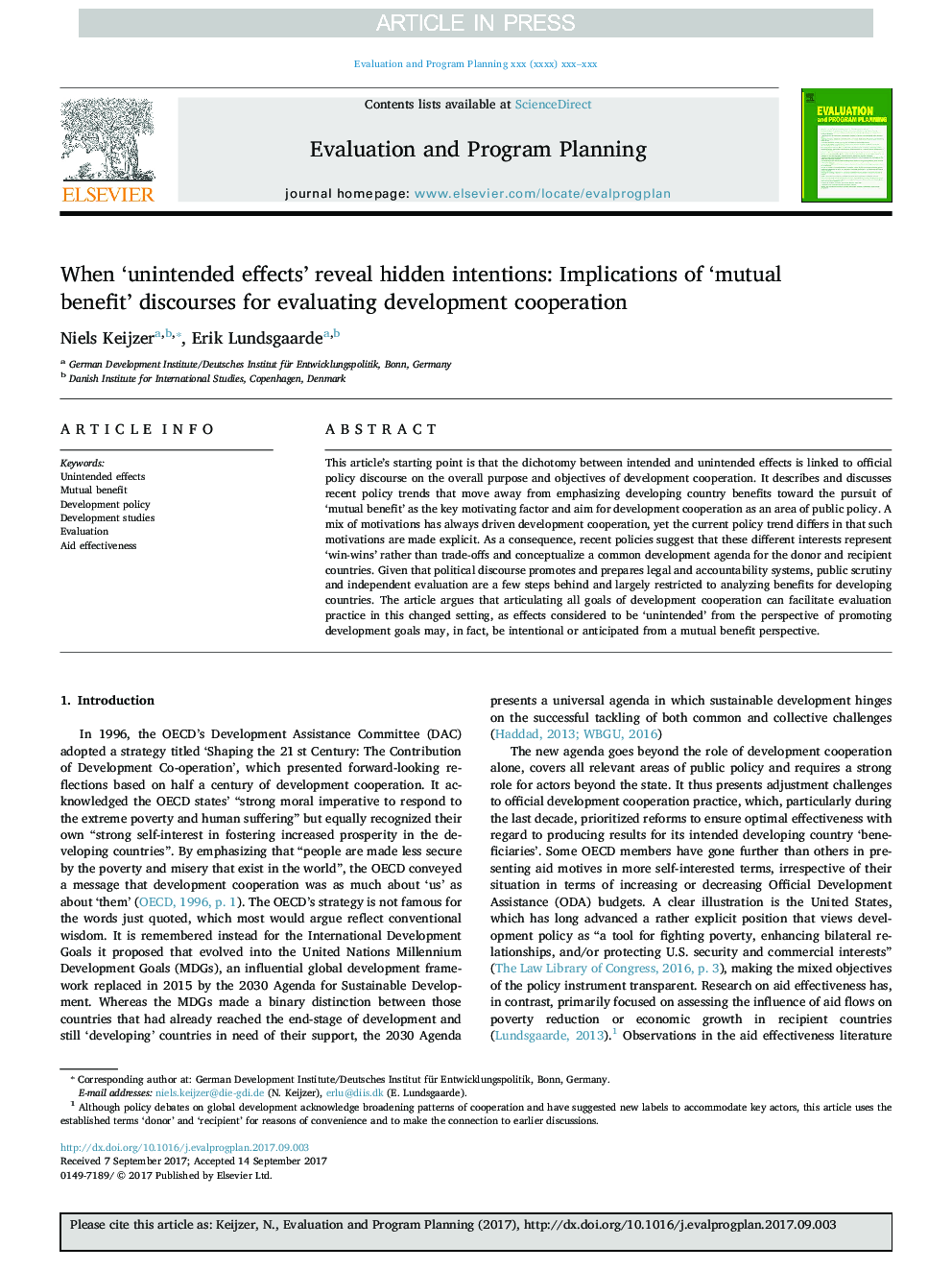| کد مقاله | کد نشریه | سال انتشار | مقاله انگلیسی | نسخه تمام متن |
|---|---|---|---|---|
| 6792139 | 1432701 | 2018 | 8 صفحه PDF | دانلود رایگان |
عنوان انگلیسی مقاله ISI
When 'unintended effects' reveal hidden intentions: Implications of 'mutual benefit' discourses for evaluating development cooperation
ترجمه فارسی عنوان
هنگامی که "اثرات ناخواسته" نیت های پنهان را نشان می دهد: پیامدهای گفت وگو "سود دوجانبه" برای ارزیابی همکاری های توسعه
دانلود مقاله + سفارش ترجمه
دانلود مقاله ISI انگلیسی
رایگان برای ایرانیان
کلمات کلیدی
اثرات ناخواسته، منافع مشترک، سیاست توسعه، مطالعات توسعه، ارزیابی، اثربخشی کمک،
ترجمه چکیده
نقطه شروع این مقاله این است که دوگانگی بین تأثیرات در نظر گرفته شده و ناخواسته با گفتگوی سیاسی رسمی در مورد هدف کلی و اهداف همکاری توسعه ارتباط دارد. این در مورد روند اخیر سیاست است که از تأکید بر مزایای در حال توسعه کشور در جهت دستیابی به منافع متقابل به عنوان عامل اصلی انگیزشی و برای همکاری توسعه به عنوان یک حوزه سیاست عمومی استفاده می کند. ترکیبی از انگیزه همواره همکاری توسعه را هدایت می کند، با این حال روند سیاست کنونی متفاوت است و در آن انگیزه ها به روشنی روشن می شود. به عنوان یک نتیجه، سیاست های اخیر نشان می دهد که این منافع متفاوتی نشان دهنده «پیروزی» است، نه سودمندی و مفهوم سازی یک برنامه توسعه مشترک برای کشورهای کمک کننده و گیرنده. با توجه به این که گفتمان سیاسی، سیستم های قانونی و حسابدهی را ترویج و تهیه می کند، بررسی عمومی و ارزیابی مستقل، گامی چند گام به جلو است و عمدتا به تجزیه و تحلیل منافع کشورهای در حال توسعه محدود می شود. این مقاله استدلال می کند که بیان کلیه اهداف همکاری توسعه می تواند عملیات ارزیابی را در این تغییرات تسهیل کند، زیرا جلوه هایی که "چشمگیر" از منظر ترویج اهداف توسعه در نظر گرفته می شود، عمدا یا پیش بینی شده از یک دیدگاه سودمند متقابل است.
موضوعات مرتبط
علوم پزشکی و سلامت
پزشکی و دندانپزشکی
سیاست های بهداشت و سلامت عمومی
چکیده انگلیسی
This article's starting point is that the dichotomy between intended and unintended effects is linked to official policy discourse on the overall purpose and objectives of development cooperation. It describes and discusses recent policy trends that move away from emphasizing developing country benefits toward the pursuit of 'mutual benefit' as the key motivating factor and aim for development cooperation as an area of public policy. A mix of motivations has always driven development cooperation, yet the current policy trend differs in that such motivations are made explicit. As a consequence, recent policies suggest that these different interests represent 'win-wins' rather than trade-offs and conceptualize a common development agenda for the donor and recipient countries. Given that political discourse promotes and prepares legal and accountability systems, public scrutiny and independent evaluation are a few steps behind and largely restricted to analyzing benefits for developing countries. The article argues that articulating all goals of development cooperation can facilitate evaluation practice in this changed setting, as effects considered to be 'unintended' from the perspective of promoting development goals may, in fact, be intentional or anticipated from a mutual benefit perspective.
ناشر
Database: Elsevier - ScienceDirect (ساینس دایرکت)
Journal: Evaluation and Program Planning - Volume 68, June 2018, Pages 210-217
Journal: Evaluation and Program Planning - Volume 68, June 2018, Pages 210-217
نویسندگان
Niels Keijzer, Erik Lundsgaarde,
